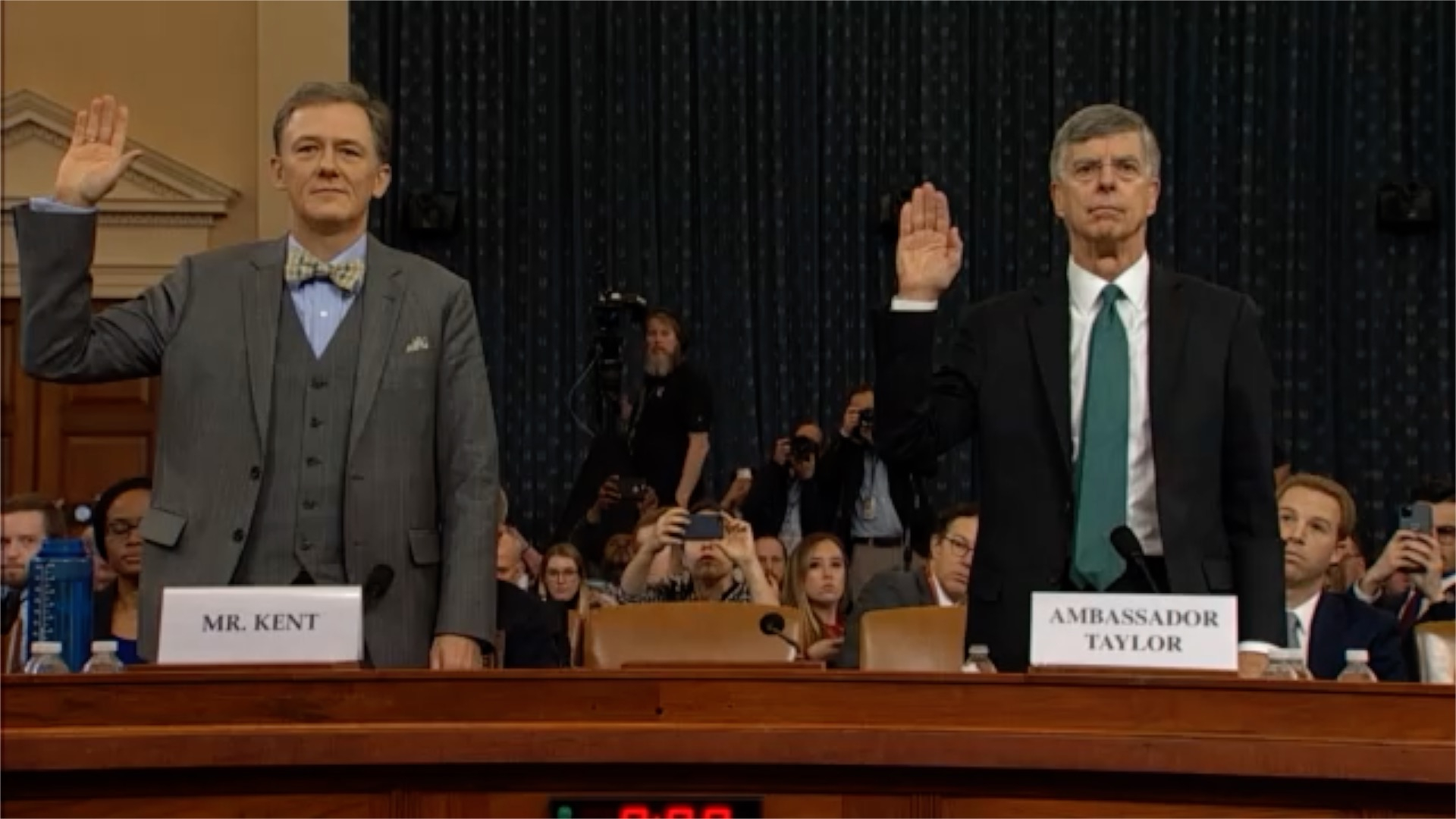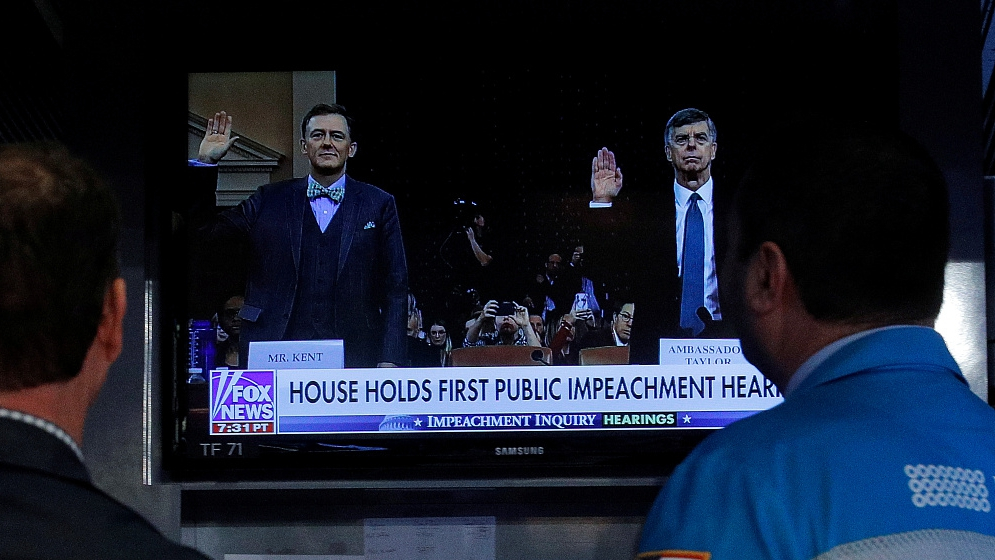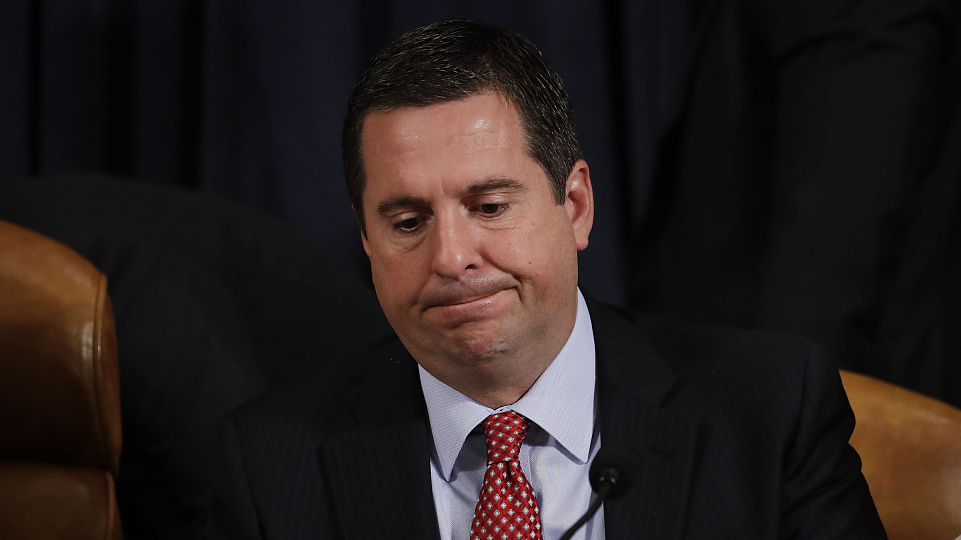Two top U.S. diplomats delivered gripping testimony on Wednesday about U.S. President Donald Trump's efforts to get Ukraine to investigate his potential 2020 rival Joe Biden, as the impeachment inquiry into the president shifted into a new phase of high-stakes televised hearings.
What did Taylor say?
William Taylor, the top U.S. diplomat in Ukraine, began his testimony before the House Intelligence Committee with a new revelation about Trump's efforts to pressure Kiev to investigate the Bidens – the matter at the heart of just the fourth impeachment process in the U.S. history.
Taylor, a former U.S. Army officer and veteran diplomat, testified that he was told Trump cared more about the probe into his rival than he did about Ukraine.
02:18

He said that since his closed testimony in October he had become aware of a telephone call between Trump and Gordon Sondland, the U.S. ambassador to the EU, that was overheard by a member of Taylor's staff.
Taylor said the staff member asked Sondland after the call what Trump thought about Ukraine. "Ambassador Sondland responded that President Trump cared more about the investigations of Biden," Taylor said.
What was Giuliani's role?
Taylor recalled his opposition to making U.S. military aid to Ukraine or a White House visit by Zelensky contingent on Kiev investigating the Bidens.
"Withholding security assistance in exchange for help with a domestic political campaign in the United States would be crazy," he said. "I believed that then and I believe it now."
Taylor said an "irregular policy channel" involving former New York mayor Rudy Giuliani, Trump's personal attorney, was pushing for the Ukrainian probe into the Bidens.

The House Intelligence Committee hearing as part of the impeachment inquiry into U.S. President Donald Trump is broadcast at the New York Stock Exchange in New York, U.S., November 13, 2019. /VCG Photo
The House Intelligence Committee hearing as part of the impeachment inquiry into U.S. President Donald Trump is broadcast at the New York Stock Exchange in New York, U.S., November 13, 2019. /VCG Photo
George Kent, a bow-tie wearing career diplomat who was the other witness at the somber and occasionally acrimonious hearing, was asked what interests Giuliani was promoting.
"I believe he was looking to dig up political dirt against a potential rival in the next election cycle," said Kent, a deputy assistant secretary of the state.
"I do not believe the United States should ask other countries to engage in selective politically associated investigations or prosecutions against opponents of those in power because such selective actions undermine the rule of law."
How has Trump responded?
Trump dismissed the probe in the Democratic-led House of Representatives as a "witch hunt" and said he was "too busy" to watch the first public hearings, during which he received staunch backing from lawmakers of his Republican Party.
Asked about the new allegations from Taylor as he hosted his Turkish counterpart Recep Tayyip Erdogan at the White House, Trump replied, "First time I've heard it."
"He did speak to me for a brief moment," he said of Sondland, "and I said no quid pro quo under any circumstances."
What was the Republican strategy?
Republican lawmakers sought to undercut the testimony of the witnesses by focusing on Hunter Biden's role on the Burisma board.

Representative Devin Nunes, a Republican from California and ranking member of the House Intelligence Committee, at the impeachment inquiry hearing in Washington, DC, U.S., November 13, 2019.
Representative Devin Nunes, a Republican from California and ranking member of the House Intelligence Committee, at the impeachment inquiry hearing in Washington, DC, U.S., November 13, 2019.
They also stressed that the Ukrainians were not aware for months that the White House had put a hold on nearly 400 million U.S. dollars in military assistance and that the amount was eventually released in September.
"What did President Zelensky actually do to get the aid?" asked John Ratcliffe, a Republican congressman from Texas. "The answer is nothing. He didn't open investigations."
What happens next?
Democrats plan to prove over several weeks of hearings that Trump abused his office by asking Ukraine to investigate Bidens. If the House impeaches the president, it would then go for a trial in the Senate, where Republicans enjoy a 53-47 majority.
The next hearing is scheduled for Friday, featuring the U.S. ambassador to Ukraine who Kent said was recalled by Trump after being subjected to a "smear campaign" by Giuliani.
Eight more witnesses, including Sondland, are to appear next week.
Coming just one year before elections, the hearings carry great risks for both parties and no certain reward, with a divided U.S. electorate weary of Washington infighting. Polls show a slim majority of Americans favor impeaching the president. But they also show that Trump's sizable voter base, which delivered his shock victory in 2016, rejects the allegations.
(With input from AFP)